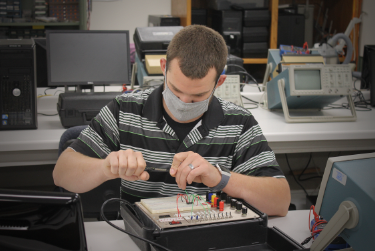
Contact: Katryn Conlin, Communications Director
651-385-6364, [email protected]
For Immediate Release
National Science Foundation awards $516,513 grant to Minnesota State College Southeast to support college-level electronics instruction in area high schools
New project will create more pathways for high school students that lead directly to college education, career success
 Photo Caption: An electronics students works on a hands-on project in the lab at MSC Southeast.
Photo Caption: An electronics students works on a hands-on project in the lab at MSC Southeast.
Winona, MN (January 6, 2021) -- Minnesota State College Southeast announces today the award of a new $516,513 grant from the National Science Foundation. This grant, guaranteed for three years, will build on MSC Southeast's proven success in creating high school partnerships that provide college credits and credentials to students throughout southeast Minnesota.
Through the project, entitled "Rural Electronics Education Hub Pilot in the Upper Mississippi River Basin," Minnesota State College Southeast will expand the pipeline of skilled technicians into electronics careers. The grant is modeled after an NSF award made to the college in 2019 of $441,952 to establish a rural advanced manufacturing education hub.
"This latest NSF grant will expand our partnerships with regional high schools by increasing opportunities for high school students to earn certificates in electronics and CNC. Currently, high school students from ten regional schools are served through this model," said Interim President Larry Lundblad. "The grant will allow more school districts to provide their students with greater opportunities in career and technical education."
Dean of Academic Innovation Heather Conley explained, "We are putting together a basic electronics certificate which will include four core classes: Intro to DC Electricity, Intro to AC Electricity, DC Theory and Circuits, and Digital Electronics I. These courses are common to a number of career pathways taught at the college, giving younger students flexibility as they learn about where they'd like to focus their attention."
The 9-credit "Introduction to Electronics Certificate" is targeted to high school students, but will also be used for entry level training or for under skilled or displaced workers in the region. At MSC Southeast the certificate can lead to further studies in Mechatronics, Biomedical Technology, Electronics Technology, Electrical Engineering Technology, and Computer Engineering Technology.
Marc Kalis, an Electronics instructor at MSC Southeast, is responsible for project oversight, management, curriculum development, and acquisition of equipment and curricular materials.
"The grant calls for us to provide instruction through a combination of methods including face-to-face lab instruction, online theory, and online simulation," he said. "We will start out with students coming to our campuses for the lab component as much as possible. But given the situation with COVID-19, it's good timing for us to explore online and distance learning options."
In addition to curriculum development and technology acquisition, the NSF grant calls for the college to develop recruitment and support strategies to encourage female, underserved/underrepresented, and Native American students to select STEM education pathways and enter the workforce in electronics-related careers.
"We are excited to be able to serve the region in this way," said Interim President Lundblad. "Employers throughout our area are constantly in need of employees for high-demand, high wage jobs that require specialized skills in electronics, mechatronics and related fields. This new NSF grant will help MSC Southeast and our partners meet those needs."
###
About Minnesota State College Southeast
Minnesota State College Southeast is a two-year technical and community college that prepares students for a lifetime of learning by providing education for employment, skill enhancement, retraining, and transfer, to meet the needs of students and the community. The Winona campus opened in 1949, merging with the Red Wing campus in 1992 and updating its name to Minnesota State College Southeast in 2016 with the change of mission to offer both technical training and the associate of arts degree. Minnesota State College Southeast is a member of Minnesota State. For more information, visit www.southeastmn.one.